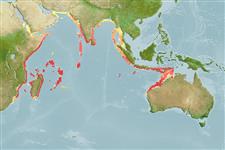Environment: milieu / climate zone / depth range / distribution range
Ecologia
marinhas demersal; intervalo de profundidade 100 - 400 m (Ref. 83903). Tropical
Western Indian Ocean: Madagascar, Mozambique, Réunion, Western Indonesia.
Tamanho / Peso / Idade
Maturity: Lm ? range ? - ? cm
Max length : 18.0 cm SL macho/indeterminado; (Ref. 83903)
Descrição suscinta
Morfologia | Morfometria
Espinhos dorsais (total): 8; Raios dorsais (total): 9. This species is distinguished by the following characters: D VIII,9; pectoral fins 15-16; gill rakers 7-8 + 19-22 = 26-29; lateral line scales 35-38; body depth at first dorsal fin origin 22-26% SL and at anus 18-22% SL; caudal-peduncle depth 8.3-9.3% SL; maximum head depth 20-24% SL; head depth through eye 17-19% SL; head length 30-34%SL; orbit length 7.7-11% SL; upper jaw length 12-14% SL; barbel length 18-24% SL; caudal-fin length 27-31% SL; anal-fin height 13-16% SL; pelvic-fin length 20-24% SL; pectoral-fin length 21-24% SL; first dorsal-fin height 19-23% SL; second dorsal-fin height 15-16% SL; 7-10 total bars on caudal fin, 3-6 pale brown bars proximally to dark brown or black at distal margin on upper caudal-fin lobe, 3-4 brown bars on lower lobe, becoming darker distally, the last 2 completely dark brown or black with bars slightly increasing in width distally, small bar on tip; width of largest lower caudal-fin lobe bar and/or space between distal-most bars less than orbit; lateral body stripes absent; tip of first dorsal-fin dark; barbels white; body white ventrally and rose-red laterally, becoming dorsally darker with some gold iridescence along dorsal flanks and a darkened saddle behind second dorsal fin; body uniformly brown or little darker dorsally, bars and black first dorsal-fin tip retained in preserved fish (Ref. 83903).
Ciclo de vida ou comportamento de acasalamento
Maturidade | Reprodução | Desova | Ovos | Fecundidade | Larvas
Fricke, R., 1999. Fishes of the Mascarene Islands (Réunion, Mauritius, Rodriguez): an annotated checklist, with descriptions of new species. Koeltz Scientific Books, Koenigstein, Theses Zoologicae, Vol. 31:759 p. (Ref. 33390)
Status na Lista Vermelha da UICN (Ref. 130435)
Ameaça para os humanos
Harmless
Uso pelos humanos
Mais informação
Nomes comunsSinônimosMetabolismoPredadoresEcotoxicologiaReproduçãoMaturidadeDesovaAgregação de desovaFecundidadeOvosDesenvolvimento dos ovos
Idade/TamanhoCrescimentoPeso-comprimentoComprimento-comprimentoFrequências de comprimentoMorfometriaMorfologiaLarvasDinâmica larvalRecrutamentoAbundânciaBRUVS
ReferênciasAquaculturaPerfil para aquaculturaEstirpesGenéticaElectrophoresesHereditariedadeDoençasProcessamentoNutrientsConversão de massa
ColaboradoresFotosStamps, Coins Misc.SonsCiguateraVelocidadeTipo de nataçãoÁrea branquialOtólitosCérebrosVisão
Ferramentas
Relatórios especiais
Baixar XML
Fontes da internet
Estimates based on models
Preferred temperature (Ref.
123201): 13.1 - 20.9, mean 16.7 °C (based on 85 cells).
Índice de diversidade filogenética (Ref.
82804): PD
50 = 0.5000 [Uniqueness, from 0.5 = low to 2.0 = high].
Bayesian length-weight: a=0.00955 (0.00454 - 0.02011), b=3.10 (2.93 - 3.27), in cm total length, based on LWR estimates for this Genus-body shape (Ref.
93245).
Nível Trófico (Ref.
69278): 3.5 ±0.4 se; based on size and trophs of closest relatives
Resiliência (Ref.
120179): Elevada, tempo mínimo de duplicação da população menor que 15 meses (Preliminary K or Fecundity.).
Fishing Vulnerability (Ref.
59153): Low vulnerability (12 of 100).
